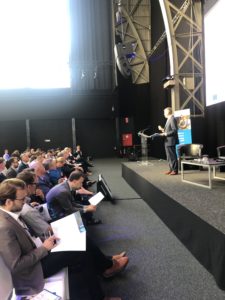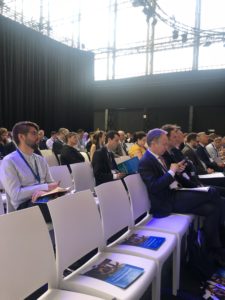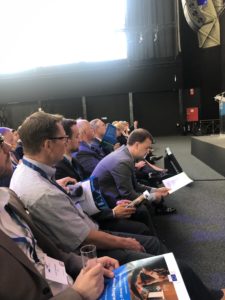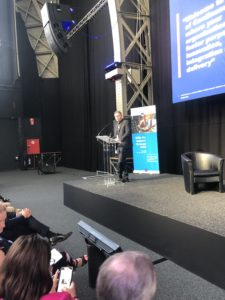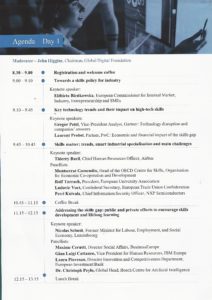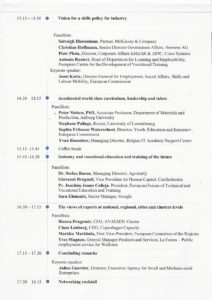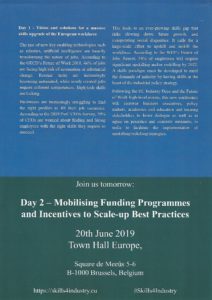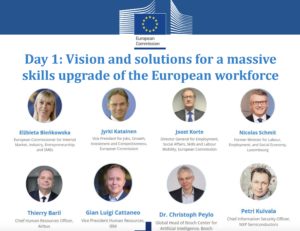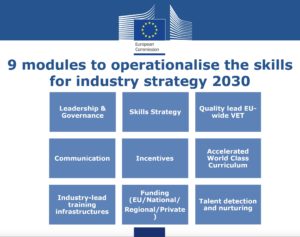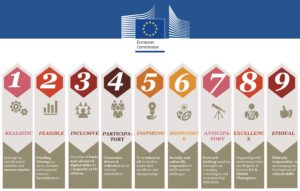EU Vision “Skills for Industry Strategy EU 2030”
On 19-20.06.2019, CEO in SPCleantech, Janusz Kahl participated in a High-Level Conference as member of 5 person Steering Committee in presentation of the Final Report Skills for Industry Strategy 2030 called the “Skills for Smart Industrial Specialisation and Digital Transformation” (hereafter “SSIS&DT”) in the head quarters of EU Commission in Brussels. European Commissioner for Internal Market, Industry, Entrepreneurship and SMEs, Elżbieta Bieńkowska participated in the conference.
The vision was prepared by PwC EU Services for the Executive Agency for Small and Medium Enterprises (hereafter “EASME”) and the Directorate General for Industry, Growth & Internal Market (hereafter “DG GROW”) of the European Commission (hereafter “the EC”). It outlines the results of the four reports developed throughout this phase of the SSIS&DT initiative: the Interim Report regrouping two state-of-play analyses and the EU 2030 High-Tech Skills Vision, the European Union – United States comparison of the high-tech skills situation, the identified best practices and, lastly, the Skills for Industry 2030 Strategy including the policy recommendations to operationalise the Vision. The latter was elaborated in close consultation with stakeholders and key experts during several expert workshops and consultations.
Professionals with high-tech skills have thepotential to serve the growing needs created by smart industrial specialisation and digital transformation (hereafter “SIS&DT”) and to offer a solid foundation for tomorrow’s workers. In turn, the competitiveness of industry is highly dependent on the knowledge, skills, competencies and creativity of its workforce. Potential shortages and gaps in skills development, combined with mismatches between labour supply and demand, directly harm job creation. These gaps are likely to widen due to the major disruption the Fourth Industrial Revolution brings to the scale at which upskilling and reskilling efforts currently take place. Advanced economies characterised by large consumer markets, such as the European Union (EU), will likely be confronted with the highest skills mismatches.
Therefore, the objective of this initiative is to develop a common vision and supporting actions on skills for SIS&DT with a view to increase the capacity of industry, social partners, education and training organisations, as well as policymakers at all levels to shape the workforce transformation in Europe. It aims to help cities, regions and Member States in designing and implementing ambitious skills policies for SIS&DT. Target groups are professionals, managers, leaders and entrepreneurs in enterprises in all sectors who need to acquire and/or update high-tech skills.
Meeting of 5 members Steering Committee, general director of Directorate General for Industry, Growth & Internal Market (“DG GROW”) and CEO in PwC in Luxembourg.
Photos from the meeting of the 5-member Steering Committee with the Director General of the Directorate General for Industry, Growth and Internal Market (“DG GROW”), André Ricjrer and the CEO at PwC in Luxemburg, Laurent Probst.

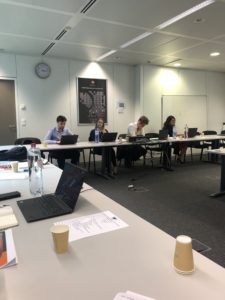
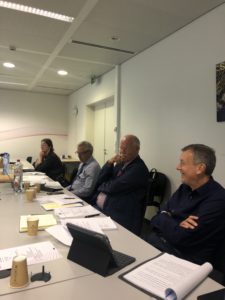
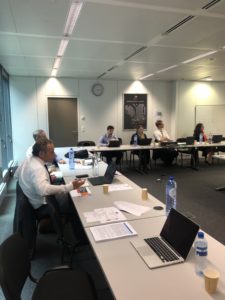
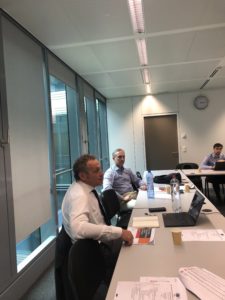 Photos from the conference “Skills for Industrial Strategy 2030” titled “Skills for Industrial Strategy 2030”. Skills for smart industrial specialization and digital transformation (hereinafter SSIS & DT) in Brussels.
Photos from the conference “Skills for Industrial Strategy 2030” titled “Skills for Industrial Strategy 2030”. Skills for smart industrial specialization and digital transformation (hereinafter SSIS & DT) in Brussels.




